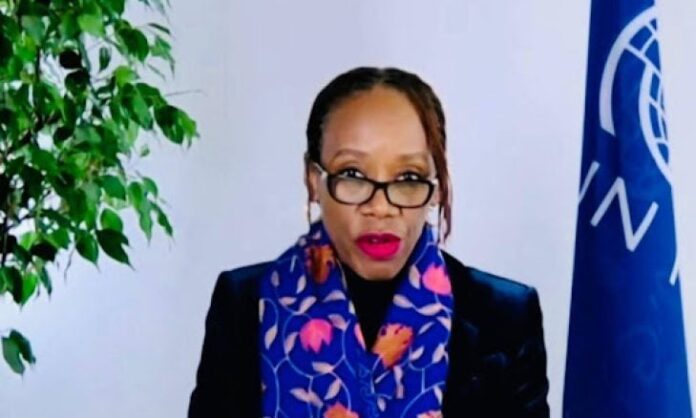United Nations – Four senior officials from United Nations humanitarian agencies held a virtual press conference to discuss the worsening situation in Sudan as the country enters the third year of its civil war. The briefing featured Ougoche Daniels, Deputy Director General for Operations at the International Organization for Migration (IOM); Kelly Clements, Deputy High Commissioner for Refugees at the UNHCR; Ted Chaiban, Deputy Executive Director for Humanitarian Action and Supply Operations at UNICEF; and Valerie Guarnieri, Assistant Executive Director of the World Food Programme (WFP).
Sudan Facing the World’s Worst Displacement Crisis
Ougoche Daniels of the IOM opened the briefing by noting that Sudan is currently experiencing “the worst displacement crisis in the world,” with more than 30 million people in urgent need of humanitarian assistance. The country has recorded 9.6 million internally displaced people and 4.3 million refugees who have crossed into neighboring states.
She emphasized that the catastrophe has been compounded by food insecurity, disease outbreaks, flooding, widespread human rights violations, and the collapse of essential services and infrastructure. “An effective response,” she stressed, “requires a collective approach by all UN agencies operating on the ground.”
Daniels explained that the IOM is implementing early recovery projects, including a solar-powered water station in Khartoum serving areas with the highest cholera rates. She also mentioned an upcoming African Development Bank–funded program in November to rehabilitate health, education, and water facilities in Gezira, White Nile, and Blue Nile states.
She concluded her remarks by renewing calls for an immediate cessation of hostilities, the protection of civilians, and unhindered humanitarian access, warning that “burdensome field bureaucracy continues to delay life-saving assistance.”
One in Three Sudanese Displaced, Widespread Violence Against Women
Kelly Clements of the UNHCR, newly returned from field visits to Port Sudan and Khartoum, described the situation as “the largest protection crisis in the world.” She noted that one in every three Sudanese people has been displaced since the outbreak of war in April 2023.
Clements recounted meeting women and children uprooted multiple times by fighting. Survivors, she said, told harrowing stories of rape used as a weapon of war, adding that “the psychological scars of these violations may never heal.”
While she observed glimmers of hope in families slowly returning to Khartoum to reopen shops and schools, she underscored that conditions remain dire. “Returning women spoke of no water, no healthcare, and of shelling continuing even as they tried to rebuild their lives,” Clements said.
She further noted that, despite the war, Sudan still hosts around 900,000 refugees from South Sudan, Ethiopia, and Eritrea, warning that growing anti-foreigner sentiment in some areas could erode the country’s long-standing traditions of refugee hospitality.
Clements closed by urging the international community to increase funding and advance urgent political solutions, stressing that “people need peace now, not later.”
Children Paying the Heaviest Price
UNICEF’s Ted Chaiban warned that Sudan is enduring “the largest humanitarian crisis in the world today,” with children standing among its chief victims. He reported that more than 14 million children are out of school—four out of every five in the country.
An estimated 1.4 million children live in famine or near-famine areas, and 150,000 are expected to suffer from severe acute malnutrition this year in Darfur alone. Cholera, malaria, and other diseases are spreading as the healthcare system crumbles.
Chaiban described the desperate situation in the besieged city of El-Fasher, isolated for more than sixteen months and home to 250,000 people without access to food, water, or medical care. “I met mothers and children fleeing bombardment, stripped of everything, walking long distances with nothing to eat,” he said.
Despite the devastation, he pointed to signs of resilience—locals repairing schools and setting up safe spaces for children. UNICEF teams and their partners, he affirmed, “continue to work despite immense danger,” having vaccinated over 8 million people against cholera and provided safe water to 11 million more.
25 Million Sudanese Facing Food Insecurity
Valerie Guarnieri of the WFP concluded the briefing by reaffirming that Sudan remains “one of our highest priorities.” She said the program had doubled its monthly reach to 4 million beneficiaries in recent months, despite extreme risks faced by aid workers.
Conditions in Darfur, she noted, remain dire, with relief convoys to El-Fasher still stuck awaiting security guarantees. She also highlighted WFP initiatives, in partnership with the World Bank and African Development Bank, to support local farmers and boost agricultural production in more stable areas such as Khartoum and Wad Madani—linking emergency aid to long-term development.
However, Guarnieri cautioned that a severe funding gap threatens ongoing operations. The humanitarian response plan for Sudan, she said, is “only 25 percent funded,” meaning millions could go without food or essential support.
At the close of the conference, all four officials repeated a unified plea for an immediate end to hostilities, unrestricted humanitarian access, and the protection of civilians and aid workers. They emphasized that, despite unspeakable suffering, the Sudanese people continue to demonstrate extraordinary bravery and resilience.
Source: Al-Quds Al-Arabi- Al-Yurae


